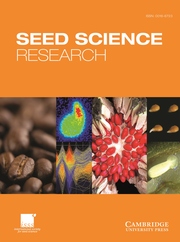Article contents
Role of desiccation in the termination of expression of genes for storage proteins
Published online by Cambridge University Press: 19 September 2008
Abstract
The final stage of development of orthodox seeds is maturation drying, a process often accompanied by a dramatic decline in storage-protein synthesis. When desiccation is imposed prematurely at certain stages prior to the completion of development, a switch in synthetic events is elicited. events unique to development, such as synthesis of storage protein, are terminated, while syntheses associated with germination and growth are initiated. We investigated whether desiccation plays a key role in effecting a decline in expression of genes for storage proteins by acting directly upon the regulatory regions of these developmental genes. The desiccation responsiveness of the 5′ and 3′ regulatory regions of the gene for the pea storage protein vicilin was tested in transgenic tobacco seed. Chimaeric genes were introduced into tobacco, these genes consisted of the coding region of the reporter gene for β-glucuronidase (GUS) and 5′ and 3′ regions from the vicilin gene, or, as controls, the same regions derived from constitutively expressed genes, presumed to be desiccation-insensitive – those from the cauliflower mosaic virus (35S) and nopaline synthase genes. In transgenic seed expressing the gene constructs containing the vicilin 5′ upstream region, GUS activities declined dramatically after imbibition in mature seed and after rehydration of prematurely dried tobacco seed. In contrast, GUS activities increased after seed rehydration when the constitutive viral (35S) promoter replaced the vicilin 5′ upstream region. The 3′ downstream region of the gene construct did not significantly affect the patterns of changes in GUS activities after seed rehydration. In studies of transient gene expression in castor bean cotyledons, premature desiccation led to termination of GUS gene expression only when the gene construct contained the vicilin 5′ upstream region. This region may respond directly to desiccation; alternatively, changes to trans-acting factors important for expression of genes for storage-proteins may occur as a result of drying.
- Type
- Short Communication
- Information
- Copyright
- Copyright © Cambridge University Press 1994
References
- 6
- Cited by


